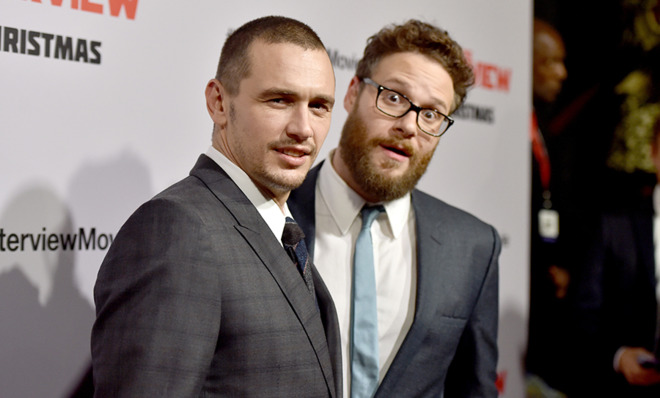America's warped fear of risk canceled The Interview
A desperate lunge against any conceivable disaster scenario is pathological and dangerous


A free daily email with the biggest news stories of the day – and the best features from TheWeek.com
You are now subscribed
Your newsletter sign-up was successful
The cancelation of The Interview because of preposterous threats from a group of hackers is depressing for all the reasons rehearsed in many other good columns across this site and and the internet. On Friday, the FBI connected the attack to North Korea (despite its denials), the most loathsome regime on the planet, a prison state that has trouble with food and 1960s rocketry.
And yet these colors ran.
It's not a surprise. The five major movie chains canceled their screenings of the satire, citing the ridiculous threat note from hackers vowing a 9/11 wherever the film was screened. Very likely each chain had a conversation with their liability lawyers. Sony then followed suit, yanking the movie entirely.
The Week
Escape your echo chamber. Get the facts behind the news, plus analysis from multiple perspectives.

Sign up for The Week's Free Newsletters
From our morning news briefing to a weekly Good News Newsletter, get the best of The Week delivered directly to your inbox.
From our morning news briefing to a weekly Good News Newsletter, get the best of The Week delivered directly to your inbox.
This has inspired Jonathan Chait to suggest that the U.S. government vow to make any private entity whole again if it suffers damage due to a terrorist threat. That's an idea, but it is a retreat if the risks of a free society and human life writ large can be continuously assigned to third-parties rather than to, you know, free people.
It would be nice if The Interview's cancelation, or delay, were just a story about bad actors and a few cowards, but I wonder if it doesn't touch on a truly unsettling attempt by our society to escape risk and tragedy altogether.
Sonny Bunch noted that one of the movie-theater chains that pulled out, Cinemark, is still dealing with liability cases related to the 2012 shooting at an Aurora, Colorado, theater during The Dark Knight Rises. Cinemark had freely offered to pay for any funeral expenses incurred by families that were not already covered by a Crime Victim's Compensation fund. But the case brought by the families of the victims is that the theater should have had security adequate to the task of defeating a lunatic equipped with smoke canisters and a Smith & Wesson M&P15 semi-automatic rifle.
In this way we transfer our moral intuition that an event like this "should never happen" into an immoral presumption that some proximate rich entity (a person or corporation, likely with liability insurance), was somehow responsible for preventing any such tragedy, no matter how novel or improbable. Judges that have refused to throw out the case have argued that perhaps movie theaters should anticipate mass shootings as a matter of course.
A free daily email with the biggest news stories of the day – and the best features from TheWeek.com
Frankly, no one should want to live in a society where an attack like James Holmes' is considered just as "foreseeable" as a grease fire in a restaurant kitchen. Just as the latter requires a fire extinguisher, should all movie showings be done on lockdown after everyone passes through metal detectors and body-scanners? No, cinema companies should not be put in a corner by liability lawyers over a previously implausible threat. A desperate lunge against any conceivable disaster scenario is pathological and dangerous. It makes us tyrants.
Our absolutized aversion to dealing with any kind of tragedy imposed from without has truly dark applications. It is precisely this existential-dread level of ass-covering and risk-management that informs the American security state's adoption of the drone "signature strike," in which men and perhaps some bystanders near are killed by drone attack even if we have no idea who they are. Their "pattern of life" in Yemen is just deemed too risky for their existence to be endured by the American military. Fire away.
Much closer to home, there is also the the advent of the wrongful-birth lawsuit. First-world parents who spend their entire life planning to avoid children until the waning days of fertility then demand that their parenthood go according to plan too. No sick or disabled children allowed.
The plea "I didn't sign up for this" in the face of disaster is true and unanswerable. Such a plea demands whatever help we can reasonably give. Any attempt to educate people into accepting these burdens can look unbelievably haughty. But our notions of free society and free citizenship rest on a view of human life that incorporates risk, even the risk of terrible tragedies.
No change to liability law, or government backstop can change the fact that the freedom from fear begins in every human heart.
Michael Brendan Dougherty is senior correspondent at TheWeek.com. He is the founder and editor of The Slurve, a newsletter about baseball. His work has appeared in The New York Times Magazine, ESPN Magazine, Slate and The American Conservative.
-
 ‘This is something that happens all too often’
‘This is something that happens all too often’Instant Opinion Opinion, comment and editorials of the day
-
 House votes to end Trump’s Canada tariffs
House votes to end Trump’s Canada tariffsSpeed Read Six Republicans joined with Democrats to repeal the president’s tariffs
-
 Bondi, Democrats clash over Epstein in hearing
Bondi, Democrats clash over Epstein in hearingSpeed Read Attorney General Pam Bondi ignored survivors of convicted sex offender Jeffrey Epstein and demanded that Democrats apologize to Trump
